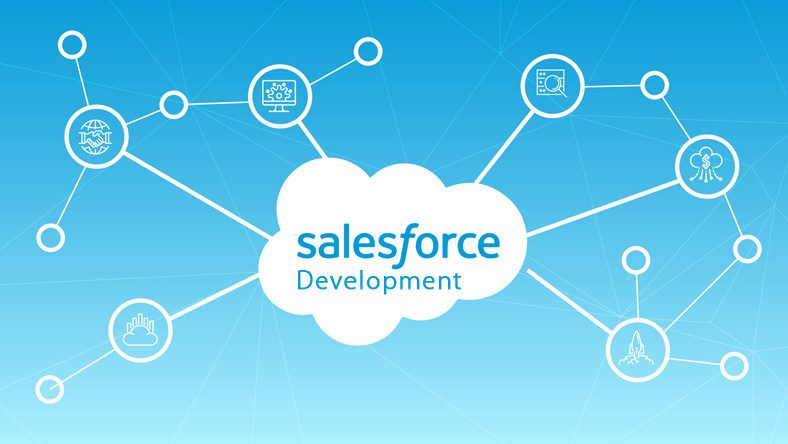Module 1: Introduction to Salesforce Development
- Overview of Salesforce Development
- Declarative vs. Programmatic Development
- Key Developer Tools: Developer Console, Visual Studio Code
- Salesforce Architecture
- Metadata-Driven Architecture
- Multitenancy and Governor Limits
- Setting Up the Development Environment
- Salesforce Developer Edition Setup
- Installing Salesforce CLI and VS Code Extensions
- Declarative vs. Programmatic Development
- Key Developer Tools: Developer Console, Visual Studio Code
- Metadata-Driven Architecture
- Multitenancy and Governor Limits
- Salesforce Developer Edition Setup
- Installing Salesforce CLI and VS Code Extensions
Module 2: Apex Programming Basics
- Introduction to Apex
- Apex Syntax and Data Types
- Execution Context in Salesforce
- Apex Classes and Triggers
- Creating Classes and Methods
- Trigger Events: Before and After Insert/Update/Delete
- Error Handling
- Try-Catch Blocks
- Custom Exception Handling
- Apex Syntax and Data Types
- Execution Context in Salesforce
- Creating Classes and Methods
- Trigger Events: Before and After Insert/Update/Delete
- Try-Catch Blocks
- Custom Exception Handling
Module 3: Advanced Apex Programming
- Object-Oriented Programming in Apex
- Inheritance, Polymorphism, and Interfaces
- Using Virtual and Abstract Classes
- SOQL and SOSL
- Writing Queries to Retrieve Data
- Working with Relationships in Queries
- Apex Transactions
- Understanding Savepoints and Rollbacks
- Managing Bulk DML Operations
- Batch Apex and Scheduled Jobs
- Writing Batch Classes
- Scheduling Apex Jobs with CRON Expressions
- Inheritance, Polymorphism, and Interfaces
- Using Virtual and Abstract Classes
- Writing Queries to Retrieve Data
- Working with Relationships in Queries
- Understanding Savepoints and Rollbacks
- Managing Bulk DML Operations
- Writing Batch Classes
- Scheduling Apex Jobs with CRON Expressions
Module 4: Lightning Web Components (LWC)
- Introduction to LWC
- Difference Between Aura and LWC
- LWC Framework Architecture
- Building Lightning Web Components
- Creating Components
- HTML Templates, JavaScript, and CSS Integration
- Component Communication
- Parent-Child Communication
- Using Lightning Message Service (LMS)
- Events in LWC
- Custom Events and Event Propagation
- Handling Lifecycle Hooks
- Difference Between Aura and LWC
- LWC Framework Architecture
- Creating Components
- HTML Templates, JavaScript, and CSS Integration
- Parent-Child Communication
- Using Lightning Message Service (LMS)
- Custom Events and Event Propagation
- Handling Lifecycle Hooks
Module 5: Visualforce Pages
- Introduction to Visualforce
- When to Use Visualforce vs. LWC
- Syntax and Page Components
- Dynamic Visualforce Pages
- Standard Controllers and Custom Controllers
- Visualforce with Apex Controllers
- Styling and Customization
- Integrating CSS and JavaScript
- Using Visualforce for PDF Generation
- When to Use Visualforce vs. LWC
- Syntax and Page Components
- Standard Controllers and Custom Controllers
- Visualforce with Apex Controllers
- Integrating CSS and JavaScript
- Using Visualforce for PDF Generation
Module 6: Salesforce Data Modeling and Management
- Custom Objects and Relationships
- Master-Detail and Lookup Relationships
- Schema Builder for Data Modeling
- Custom Fields and Formulas
- Formula Fields for Advanced Calculations
- Roll-Up Summary Fields
- Data Management
- Import and Export Using Apex
- Data Masking and Anonymization
- Master-Detail and Lookup Relationships
- Schema Builder for Data Modeling
- Formula Fields for Advanced Calculations
- Roll-Up Summary Fields
- Import and Export Using Apex
- Data Masking and Anonymization
Module 7: Integration with External Systems
- Introduction to Salesforce APIs
- REST and SOAP APIs
- Differences Between API Types
- Apex Callouts
- Consuming External APIs
- Using Named Credentials for Authentication
- Platform Events and Streaming API
- Event-Driven Architecture in Salesforce
- Publishing and Subscribing to Events
- Integration Tools
- Using MuleSoft and External Systems
- Understanding Salesforce Connect and External Objects
- REST and SOAP APIs
- Differences Between API Types
- Consuming External APIs
- Using Named Credentials for Authentication
- Event-Driven Architecture in Salesforce
- Publishing and Subscribing to Events
- Using MuleSoft and External Systems
- Understanding Salesforce Connect and External Objects
Module 8: Application Lifecycle Management
- Change Management
- Using Sandboxes for Development and Testing
- Deployment Strategies: Change Sets, ANT Migration Tool
- Version Control
- Git Basics for Salesforce Projects
- Best Practices for Managing Metadata
- Packaging
- Creating Unmanaged and Managed Packages
- Distributing Apps via AppExchange
- Using Sandboxes for Development and Testing
- Deployment Strategies: Change Sets, ANT Migration Tool
- Git Basics for Salesforce Projects
- Best Practices for Managing Metadata
- Creating Unmanaged and Managed Packages
- Distributing Apps via AppExchange
Module 9: Debugging and Testing
- Debugging Apex Code
- Debug Logs and System.Debug()
- Tools: Developer Console, Salesforce CLI
- Writing Test Classes
- Test Class Syntax and Annotations
- Achieving Code Coverage Requirements
- Performance Optimization
- Best Practices for Optimizing Apex and SOQL
- Analyzing Governor Limits
- Debug Logs and System.Debug()
- Tools: Developer Console, Salesforce CLI
- Test Class Syntax and Annotations
- Achieving Code Coverage Requirements
- Best Practices for Optimizing Apex and SOQL
- Analyzing Governor Limits
Module 10: Advanced Topics
- Governor Limits
- Understanding and Managing Platform Limits
- Async Apex
- Future Methods and Queueable Apex
- Leveraging Platform Events and Batch Jobs
- Custom Metadata and Custom Settings
- Differences and Use Cases
- Encryption and Security
- Securing Apex Code
- Using Shield Platform Encryption
- Understanding and Managing Platform Limits
- Future Methods and Queueable Apex
- Leveraging Platform Events and Batch Jobs
- Differences and Use Cases
- Securing Apex Code
- Using Shield Platform Encryption

